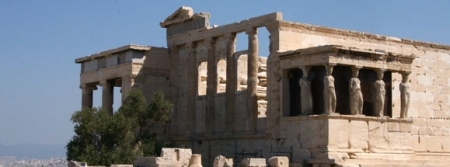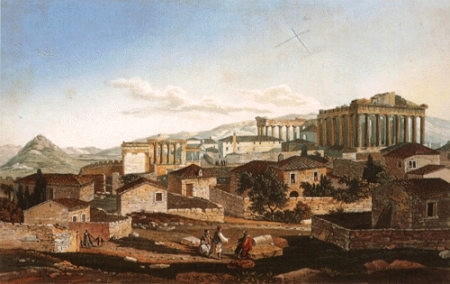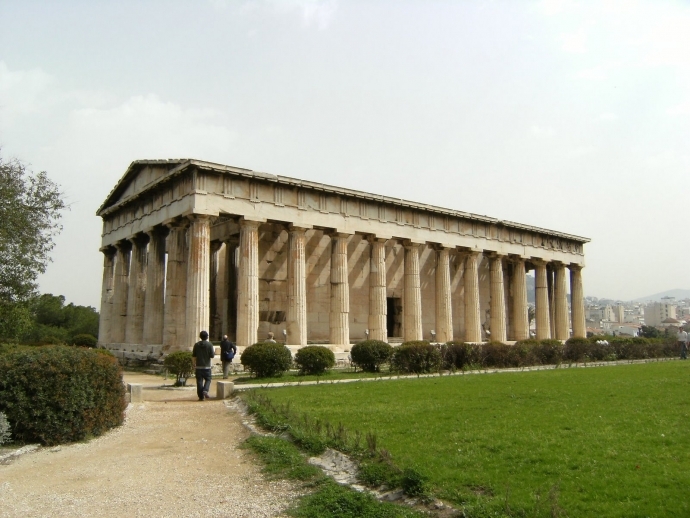Greek History

Greece is a land synonymous with history and archaeology, and as such is a perfect place to travel on a cultural holiday. From the Bronze Age civilizations of Mycenae, Knossos and Santorini to the Classical giants of Athens, Sparta, Rhodes and Delphi; from the Byzantine wonders of Mistra, Monemvasia and Patmos to the modern comforts and pleasures on offer in Athens and Thessaloniki. The sights of Ancient, Medieval and Modern Greece are simply world-class.
Famous in the western world as the birthplace of history, philosophy, theatre and democracy (among much else), Greece has witnessed the passage of some of the ancient world’s most gifted individuals. Less well known is its later role as an important part of the Byzantine world, and as a province in the Ottoman Empire. Its winding path through history has endowed Greece with a variety of archaeological and architectural jewels from all ages, as well as a series of world-class museums devoted to its ancient heritage and its modern culture: the Benaki Museum of Islamic Art and the Jewish Museum of Greece should not be missed.
In short, Greece provides an insight into many of the major Mediterranean civilizations, both past and present, and the achievement of its peoples has provided the very bedrock on which many of them were built. Here’s a very brief overview of some of the key moments in its history.
Greece: a brief timeline
6500-3000 BC The Neolithic Period
The first permanent villages are established. Plants and animals are domesticated. Farming begins.
3000-1150 BC The Bronze Age
The first palaces are built in Crete c.2000 by the Minoans. Mycenae becomes a major power centre on the mainland c.1600 but is destroyed c.1200.
1150-750 BC The Dark Age
Populations recover from widespread destruction. Iron tools start to be made. The Greek alphabet is developed. The first Olympic Games are held in 776.
750-479 BC The Archaic Period
City-states emerge, colonies are founded around the Mediterranean and Black Sea; Sparta becomes the predominant land power; Athenian sea power challenges Sparta; the Persians invade, but are defeated in 490 and 480-479.
479-336 BC The Classical Period
The Greek city-states fight furiously against each other and alliances are formed and broken; Athens is defeated by Sparta in 404; Sparta is defeated by Thebes in 371; and Philip II of Macedon, father of Alexander the Great, is elected leader of Greece in 338, only to be assassinated in 336.
336-146 BC
Alexander the Great becomes king of Macedonia and leader of Greece in 336, and subsequently conquers the Persian Empire before dying in 323. His generals fight for control of his empire, and Greece falls to none of them, but is influenced by all. The Romans fight three wars against the Kingdom of Macedon, and in 146 they sack Corinth and annex Greece.
146 BC-AD 330
Greece is divided into Roman provinces. Much construction is undertaken in the various city-states and sanctuaries; Saint John writes the Book of Revelation in a cave on Patmos. Greece and Greek Asia become the cultural centres of the eastern part of the Empire, but after centuries of peace on the mainland, the Heruli, Germanic nomads, invade and sack Athens in AD 267.
330-1099
On 11th May 330, Constantinople is founded and Christianity legalised. The Roman Empire splits in two in 395, and Greece becomes a part of the Byzantine Empire. It slowly becomes a backwater, and is devastated by plague in the late sixth century. The Slavs invade from the north; an Arabic force occupies Crete in 823, and constantly harries the mainland. In 1095 the First Crusade passes through Greece, and ends with the capture of Jerusalem in 1099.
AD 1099-1460
In 1204 the Fourth Crusade sacks Constantinople. Greece is divided into areas ruled by various western aristocrats and Byzantine successor states. The Aydin and Mentese Turkish tribes invade in the late 13th century, before the Ottoman Turks finally conquer all of mainland Greece in 1460, although many islands remain in western hands.
1460-1821
Rhodes falls to the Ottomans in 1522, Cyprus in 1570, and Crete in 1669. In the 18th century expatriate Greeks and Philhellenes nurture the idea of an independent Greece.
1821-1939
The War of Independence lasts from 1821-1832, and ends with a Greek state comprising Attica, the Peloponnese and some of the island chains. The Balkan Wars of 1912-1913 draw in many of the remaining mainland territories that are now part of the Greek state. Greece is neutral for the early years of the First World War, but joins the allies before the end. Greek armies invade Asia Minor in 1919, but are turned back by Ataturk in 1922, who goes on to create the new nation of Turkey. The surviving Greek/Christian population of Asia Minor is exchanged for much of the Muslim population of Greece.
1939-1974
Italy invades Greece on the 28th October 1940, but is heavily defeated. The German army moves to assist, and rapidly seizes control of the country. Resistance groups fight continuously against the invaders, but reprisals are heavy. The occupation ends in 1944, but a civil war breaks out almost immediately and lasts until 1949. Greece joins NATO, and holds democratic elections, but a coup is staged in 1967 by a group of little known colonels, who rule until 1974, with increasing repression.
1974 –
Free elections are held in 1974. From that time power alternates between the PASOK and Nea Dhimokratia parties; Greece joins the European Community in 1981, and hosts the Olympic Games in 2004.






